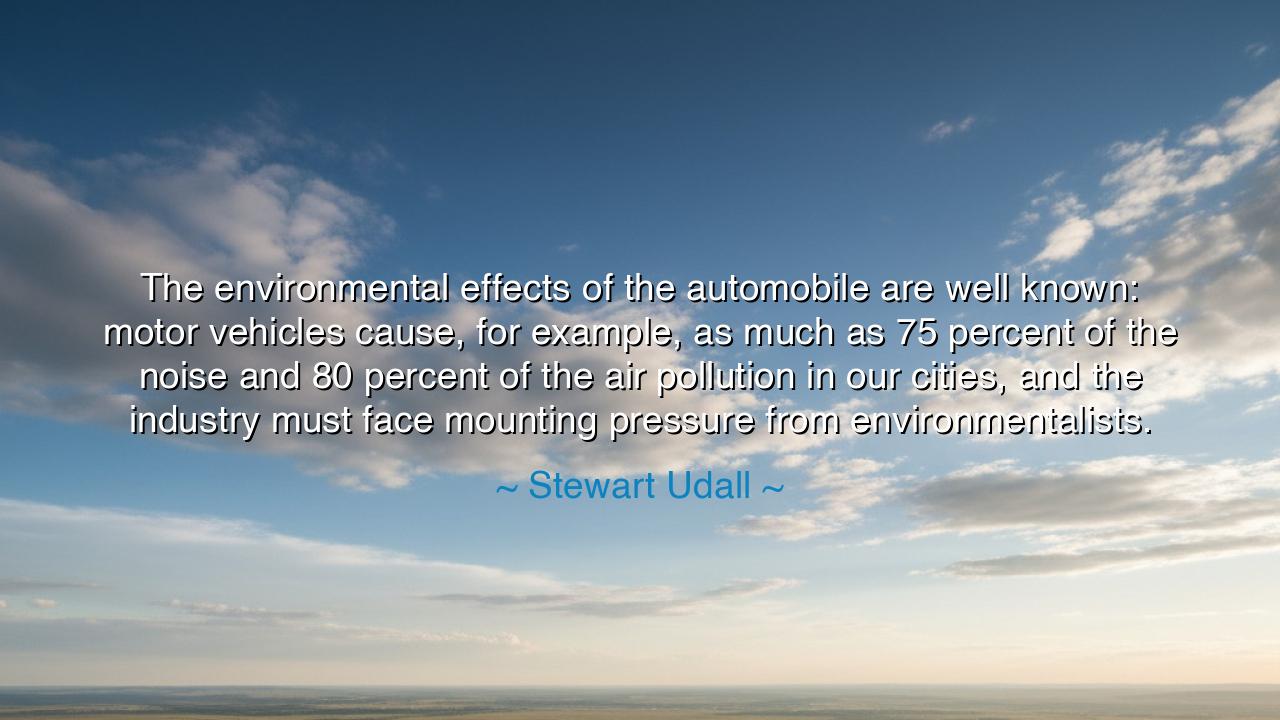
The environmental effects of the automobile are well known: motor
The environmental effects of the automobile are well known: motor vehicles cause, for example, as much as 75 percent of the noise and 80 percent of the air pollution in our cities, and the industry must face mounting pressure from environmentalists.






Hear, O children of the earth, the solemn words of Stewart Udall, who foresaw with clarity the trials of our age: “The environmental effects of the automobile are well known: motor vehicles cause, for example, as much as 75 percent of the noise and 80 percent of the air pollution in our cities, and the industry must face mounting pressure from environmentalists.” This is not a mere observation of machines and smoke, but a warning sounded like a trumpet, calling humanity to awaken from its slumber of convenience. For Udall spoke in an age when the automobile had already conquered the modern world, but when its hidden costs had yet to be fully reckoned with.
The meaning of this teaching is powerful. The automobile, hailed as a symbol of freedom and progress, carried with it burdens that weighed heavily upon the earth. It filled the skies of cities with choking smog, spread noise into every street, and unleashed rivers of carbon that would alter the climate itself. Udall names these effects plainly, refusing to let the glittering image of progress blind us to the shadow it cast. And he reminds us that these harms are not secrets—they are well known, yet often ignored, hidden beneath the roar of engines and the glow of neon lights.
Consider the story of Los Angeles in the mid-twentieth century. As automobiles multiplied, the city became cloaked in a haze of air pollution, so thick that children were kept indoors and the mountains could vanish from sight. Scientists traced the smog to the tailpipes of millions of cars, yet industry resisted, insisting on its right to profit. It was only when environmentalists and citizens rose in anger that regulations were enacted, leading to the first efforts at cleaner engines. Here we see Udall’s words made flesh: the industry does not change by itself—it must be pressed, pushed, and compelled by those who speak for the earth.
History gives another lesson in the oil shocks of the 1970s. As fuel supplies faltered, the automobile’s dominance revealed its weakness. Nations that had built their lives upon cheap gas suddenly found themselves vulnerable. Out of this crisis came new demands for efficiency, for smaller cars, for alternatives to endless consumption. Yet these changes were born not from the wisdom of foresight, but from the pain of necessity. Udall’s call was to act before catastrophe, to heed the warnings of environmental effects rather than wait for crisis to force the hand.
Mark this well, O listener: every convenience bears its cost. The automobile grants speed, but it robs the lungs of children. It brings independence, but it shatters the quiet of the night with endless noise. It expands horizons, but it shrinks the purity of the air we breathe. To ignore these costs is folly; to pretend they are minor is deception. True wisdom lies not in rejecting progress, but in shaping it so that it serves both humanity and the earth.
Let this be the lesson: do not walk blindly in the path of consumption. If you must drive, drive wisely. Choose vehicles that tread lightly, reduce unnecessary journeys, and support the rising tide of cleaner alternatives—public transport, electric cars, bicycles, and the strength of one’s own feet. And when industry resists, when it clings to profit at the expense of life, lend your voice to the mounting pressure of those who demand justice for the earth. For silence is complicity, but action is the seed of change.
Therefore, O child of tomorrow, carry Udall’s warning as a banner. Let not the roar of engines drown the cry of the earth. Demand from leaders, from companies, and from yourself a new vision of mobility—one that honors the air, the water, the land, and the generations to come. For the automobile need not remain a curse; it can be reshaped into a servant of both progress and the planet. But only if we listen, and only if we act.
Thus, Stewart Udall’s words stand as both judgment and hope: the industry must face pressure, and we are that pressure. The world will not heal itself, but through our courage, our choices, and our voices, the cities may yet breathe clean again.






AAdministratorAdministrator
Welcome, honored guests. Please leave a comment, we will respond soon